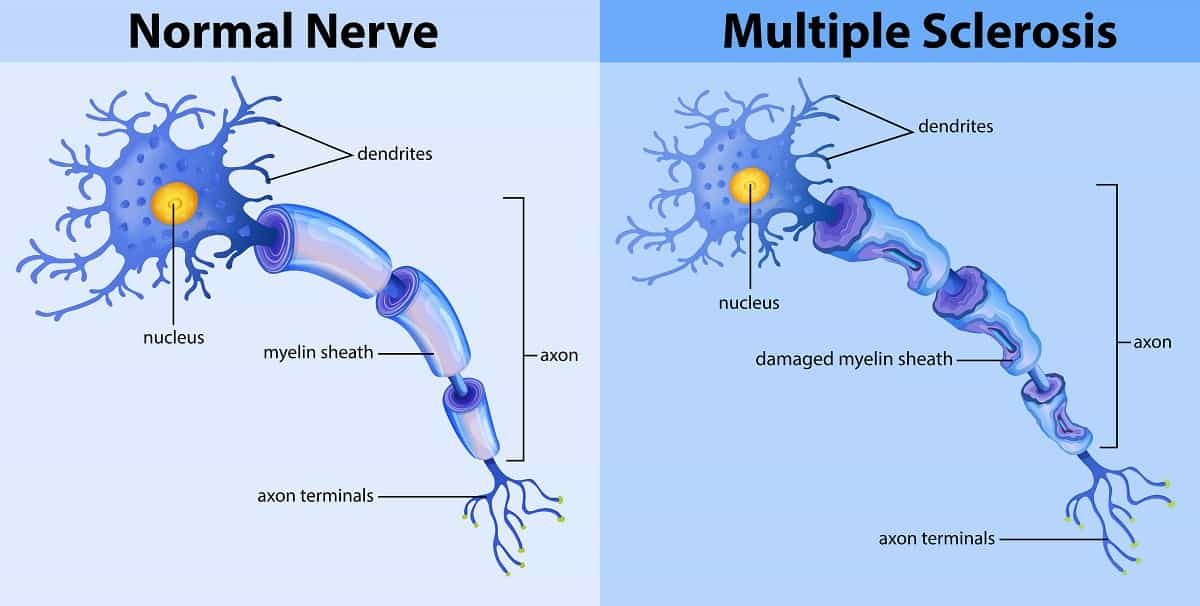Multiple sclerosis is a neuromuscular disease affecting the central nervous system . It can cause a variety of symptoms, including balance problems, muscle weakness, tremors, vision problems, and difficulty understanding. The disease can cause disability and have a major impact on the quality of life of those affected.
In this disease, the immune system mistakenly attacks myelin , the substance that surrounds and protects nerve cells . This damages the nerve endings and can lead to various physical and mental problems. While the condition can affect anyone, women are affected twice as often as men .
But why are women more likely than men to develop multiple sclerosis? What are the risk factors associated with female disease?
Multiple sclerosis is mostly diagnosed between the ages of 20 and 40, mainly in women, with an almost 3 to 1 ratio of men to women. It affects 2.5 to 3 million people worldwide, of which 600,000 in Europe and 122,000 in Italy alone.
Some of the more common risk factors for MS in women include age, genetics, race and smoking . In general, women develop multiple sclerosis earlier than men. Women were also more likely to have close relatives with the disease, suggesting some degree of genetics is at play.
Some studies also show that white women are more likely to develop the disorder than women of other races. But the reasons for this difference in risk are not fully understood.
Smoking is another common risk factor for MS in women. In fact, women who smoke have a higher risk of developing the disease than women who don't smoke. Smoking increases inflammation in the body and can cause nerve damage which can lead to the development of disease.
Additionally, multiple sclerosis can have a major impact on women's sexual and reproductive health . The disorder can cause problems with menstrual cycles, fertility, and menopause . Also, some women with multiple sclerosis may have difficulty getting pregnant or are at risk of having a high-risk pregnancy. Fatigue, visual disturbances, sphincter disturbances, sexual disturbances, and sensory and motor disturbances are the most common manifestations of multiple sclerosis. At the onset of the disease they are variable and can occur individually or in combination in an acute or progressive form. The frequency of symptoms also varies with age, with visual impairment predominant in affected cases younger than 20 years of age and mobility problems predominant in later cases. With age, the transition from relapsing-remitting to progressive is frequent and disability accumulates more rapidly. This period may coincide with the menopausal transition, during which symptoms overlap with the underlying disorder and worsen the clinical condition. Some of these symptoms , such as anxiety, mood disturbances, and cognitive impairment , may overlap in such a way that it can be difficult to distinguish exacerbations due to the natural history of the disease from smoother transitions.
Fortunately, there are many treatment options for MS that can help manage symptoms and improve the quality of life for women with the disease. These include physical therapy, immunomodulatory drugs, and complementary therapies such as meditation and acupuncture . Early treatment can prevent disease progression and increased disability. Therefore, the aim of treatment must be to prevent the accumulation of lesions, bearing in mind that the earlier the intervention, the more effective it will be in the long term.
Additionally, women with multiple sclerosis may benefit from psychological support and group therapy . These can help reduce the stress and anxiety associated with the illness and can provide an opportunity to connect with others who are going through the same experience.
In conclusion, multiple sclerosis is a complex disease that seriously affects the lives of women. While there are many risk factors associated with the disease, there are also many treatment options available to help manage symptoms and improve quality of life. While the disease can be difficult to cope with, there are many resources available to women with multiple sclerosis, including counseling and support groups.
You may also like
Combatting Hair Loss: Current treatments and promising studies
Hair loss affects millions globally, manifesting distinctively across genders. With varying incidences worldwide, understanding its causes is crucial. This article delves into symptoms, current treatments, and promising studies, shedding light on related skin and dental issues.
Acne: The disparities between teenage and adult acne
Acne, a common skin condition, affects millions globally, transcending age and geography. This article delves into the symptoms, the disparities between teenage and adult acne, and explores both traditional and revolutionary new treatments, including those still under trial. Additionally, it covers related dermatological issues like hair loss, atopic dermatitis, psoriasis, and dental care advancements.
Atopic Dermatitis: New treatments and research studies are transforming patient care worldwide.
A comprehensive exploration of atopic dermatitis, psoriasis, and related skin conditions including hair loss, acne, and dental care. New treatments and research studies are transforming patient care worldwide.
Dental Implants and Oral Hygiene: Methods and Treatments
This article delves into the world of dental implants and oral hygiene, exploring various methods and treatments available. It highlights the challenges associated with maintaining dental hygiene, the intricacies of implantology, and emerging research in the field. Additionally, it touches upon the innovative treatments for related concerns such as hair loss, atopic dermatitis, psoriasis, and acne.
